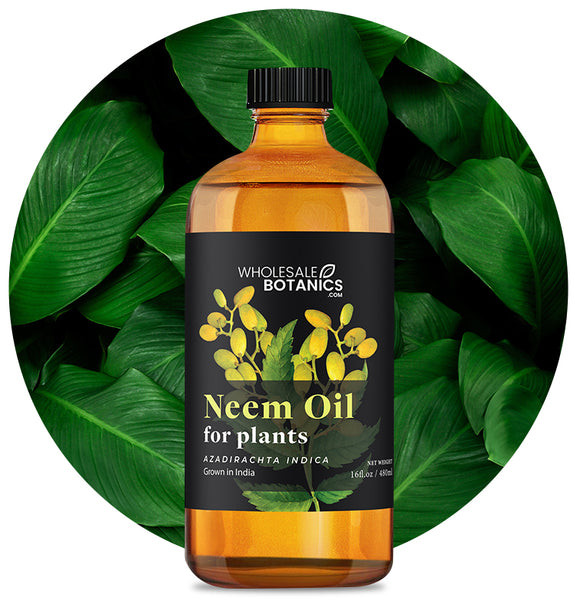
The oil is 100% Vegan - No animal was harmed nor used in the manufacturing of this product.
We work with farms and producers in over 30 countries to support renewable harvest and grow practices.
We have a 4.7/5 Trustpilot Rating.
Neem Oil: Oil Report
See the composition of our Neem Oil and access its Certificate of Analysis below.
Product Specifications

Neem Ingredient Profile
Origin & Extraction Summary- India
How to Use Neem Oil for Plants?
Neem oil is a popular choice in natural garden care. When properly diluted, it can be sprayed onto plant leaves to help maintain a fresh, beautiful-looking appearance and support your regular plant care routine.
How to Apply Neem Oil for Plants?
Mix neem oil for plants with water and a small amount of mild soap to help it blend. Spray directly onto the tops and undersides of leaves, ideally during cooler parts of the day, and avoid applying during direct sun exposure.
Can I Apply Neem Oil in Direct Sunlight?
It’s best to apply neem oil for plants in the early morning or late evening. Direct sunlight after application may increase the chance of leaf sensitivity or damage, especially on delicate plants.
How Often to Use Neem Oil for Plants?
Apply neem oil every 7–10 days as part of a consistent garden routine. Reapply after rain or heavy watering to keep the leaves evenly coated and looking their best.
What Our Customers Think
Frequently Asked Questions About Neem Oil for Plants
Is Neem Oil Good for Plants?
Yes, Neem oil is good for plants. It functions as a natural pesticide to keep your plants safe from mites, beetles, and other pests. That said, it's important to avoid using Neem oil in direct sunlight because this can lead to leaf burn. To protect your plants, properly use Neem oil for plants at night.
Is Neem Oil Safe for Plants?
Neem oil is safe to use on many plants; however, it should not be used on peppers, thyme, oregano, cilantro, parsley, or dill. While these are the most notable plants to avoid spraying with Neem oil, it's not an exhaustive list, so always check your plants before you spray. If you’re ever unsure about which plants you should spray with Neem oil, start by spraying one patch and monitoring the results. Be careful when spraying Neem oil on plants you plan on eating -- be sure to wash the oil off thoroughly before consumption.
What Bugs Does Neem Oil Deter?
Neem oil prevents a lot of bugs. However, the most common bugs that it prevents include mites, beetles, aphids, whiteflies, and Mealybugs. You can also test it out in some areas of your garden to see if it's deterring the bugs you need it to.
Is Neem Oil Safe for Tomato Plants?
Neem oil is generally safe for tomato plants when properly diluted. Always apply during cooler hours and spot test before broad application. Avoid oversaturating flowers or fruits to reduce the chance of residue buildup. And, of course, be sure to thoroughly wash Neem oil off your tomatoes before eating them.
Can Neem Oil Prevent Fungus in Plants?
Neem oil is commonly used in plant care routines to support clean, well-maintained foliage. While not a registered fungicide, it’s often part of a natural gardening approach for surface care and overall plant appearance.
Will Neem Oil Harm Ladybugs or Bees?
Neem oil for plants is not known to harm beneficial insects like bees or ladybugs when used correctly. Avoid spraying directly on flowers or during peak pollinator hours to help protect friendly garden visitors.
Can I Use Neem Oil on Seedlings?
Neem oil for plants can be used on seedlings, but it must be very diluted. Apply during cooler times of day and test a small area first, as young plants are more sensitive to oils and moisture levels.
Just Right
Happy with the packaging and quality
Strong Lid
Shipping time was faster than listed
Easy Green Routine
Makes plant care quick and easy
Fresher Foliage
Leaves the leaves clean and shiny
Leaf Care Shine
My plants look fresher after using this









